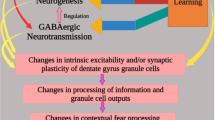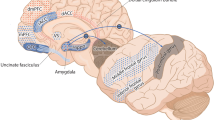Abstract
There is an increasing evidence that corticosteroids damage the hippocampus in rodents and in primates. Hippocampal atrophy induced by corticosteroids may play an important role in the pathogenesis of a range of neuropsychiatric disorders. Hippocampus is necessary for short-term memory consolidation and HPA axis regulation. Signs of hippocampal damage (HPA dysregulation in combination with memory impairment) are found in affective disorders, Alzheimer’s disease and in posttraumatic stress disorder. MRI volumetry reveals reduced hippocampal volume in these diseases. Evidence supporting the “glucocorticoid hypothesis” of psychiatric disorders is reviewed in the first part of the paper. Unresolved questions concerning temporary aspects of neurodegeneration, causality, reversibility, type of damage, factors increasing hippocampal vulnerability, and both pharmacological (CRH antagonists, antiglucocorticoid drugs, GABA-ergic, serotonergic, glutamatergic agents) and non-pharmacological (psychotherapy) treatment approaches are discussed in the second part.
Similar content being viewed by others
References
Arana GW, Baldessarini RJ, Ornsteen M (1985) The dexamethasone suppression test for diagnosis and prognosis in psychiatry. Commentary and review. Arch Gen Psychiatry 42:1193–1204
Bender BG, Lerner JA, Poland JE (1991) Association between corticosteroids and psychologic change in hospitalized asthmatic children. Ann Allergy 66:414–419
Bremner JD, Narayan M, Anderson ER, Staib LH, Miller HL, Charney DS (2000) Hippocampal volume reduction in major depression. Am J Psychiatry 157:115–118
Bremner JD, Randall P, Scott TM, Bronen RA, Seibyl JP, Southwick SM, Delaney RC, McCarthy G, Charney DS, Innis RB (1995) MRI-based measurement of hippocampal volume in patients with combat-related posttraumatic stress disorder [see comments]. Am J Psychiatry 152: 973–981
Bremner JD, Randall P, Vermetten E, Staib L, Bronen RA, Mazure C, Capelli S, McCarthy G, Innis RB, Charney DS (1997) Magnetic resonance imaging-based measurement of hippocampal volume in posttraumatic stress disorder related to childhood physical and sexual abuse — a preliminary report. Biol Psychiatry 41:23–32
Bremner JD, Scott TM, Delaney RC, Southwick SM, Mason JW, Johnson DR, Innis RB, McCarthy G, Charney DS (1993) Deficits in short-term memory in posttraumatic stress disorder. Am J Psychiatry 150: 1015–1019
Brown ES, Rush AJ, McEwen BS (1999) Hippocampal remodeling and damage by corticosteroids: implications for mood disorders. Neuropsychopharmacology 21:474–484
Checkley S (1996) The neuroendocrinology of depression and chronic stress. Br Med Bull 52:597–617
Convit A, de Leon MJ, Tarshish C, De Santi S, Tsui W, Rusinek H, George A (1997) Specific hippocampal volume reductions in individuals at risk for Alzheimer’s disease. Neurobiol Aging 18:131–138
De Bellis MD, Chrousos GP, Dorn LD, Burke L, Helmers K, Kling MA, Trickett PK, Putnam FW (1994) Hypothalamic-pituitary-adrenal axis dysregulation in sexually abused girls [see comments]. J Clin Endocrinol Metab 78:249–255
de Wilde EJ, Kienhorst IC, Diekstra RF, Wolters WH (1992) The relationship between adolescent suicidal behavior and life events in childhood and adolescence. Am J Psychiatry 149:45–51
Dupont RM, Jernigan TL, Heindel W, Butters N, Shafer K, Wilson T, Hesselink J, Gillin JC (1995) Magnetic resonance imaging and mood disorders. Localization of white matter and other subcortical abnormalities. Arch Gen Psychiatry 52: 747–755
Feldman S, Weidenfeld J (1995) Neural mechanisms involved in the corticosteroid feedback effects on the hypothalamo-pituitary-adrenocortical axis. Prog Neurobiol 45:129–141
Giap BT, Jong CN, Ricker’ JH, Cullen NK, Zafonte RD (2000) The hippocampus: anatomy, pathophysiology, and regenerative capacity. J Head Trauma Rehabil 15: 875–894
Gould E, Tanapat P (1999) Stress and hippocampal neurogenesis. Biol Psychiatry 46:1472–1479
Greenwald BS, Mathe AA, Mohs RC, Levy MI, Johns CA, Davis KL (1986) Cortisol and Alzheimer’s disease, II: Dexamethasone suppression, dementia severity, and affective symptoms. Am J Psychiatry 143:442–446
Gurvits TV, Shenton ME, Hokama H, Ohta H, Lasko NB, Gilbertson MW, Orr SP, Kikinis R, Jolesz FA, McCarley RW, Pitman RK (1996) Magnetic resonance imaging study of hippocampal volume in chronic, combat-related posttraumatic stress disorder. Biol Psychiatry 40:1091–1099
Höschl C (1991) Do calcium antagonists have a place in the treatment of mood disorders? Drugs 42: 721–729
Heim C, Newport DJ, Heit S, Graham YP, Wilcox M, Bonsall R, Miller AH, Nemeroff CB (2000) Pituitary-adrenal and autonomic responses to stress in women after sexual and physical abuse in childhood. JAMA 284: 592–597
Holsboer F (2000) The corticosteroid receptor hypothesis of depression. Neuropsychopharmacology 23:477–501
Kirschbaum C, Wolf OT, May M, Wippich W, Hellhammer DH (1996) Stress- and treatment-induced elevations of Cortisol levels associated with impaired declarative memory in healthy adults. Life Sei 58:1475–1483
Lenox RH, Peyser JM, Rothschild B, Shipley J, Weaver L (1985) Failure to normalize the dexamethasone suppression test: association with length of illness. Biol Psychiatry 20: 333–337
Magarinos AM, Deslandes A, McEwen BS (1999) Effects of antidepressants and benzodiazepine treatments on the dendritic structure of CA3 pyramidal neurons after chronic stress. Eur J Pharmacol 371:113–122
Magarinos AM, McEwen BS (1995a) Stress-induced atrophy of apical dendrites of hippocampal CA3c neurons: comparison of stressors. Neuroscience 69: 83–88
Magarinos AM, McEwen BS (1995b) Stress-induced atrophy of apical dendrites of hippocampal CA3c neurons: involvement of glucocorticoid secretion and excitatory amino acid receptors. Neuroscience 69:89–98
Malison RT, Anand A, Pelton GH, Kirwin P, Carpenter L, McDougle CJ, Heninger GR, Price LH (1999) Limited efficacy of ketoconazole in treatment-refractory major depression. J Clin Psychopharmacol 19:466–470
Mauri M, Sinforiani E, Bono G, Vignati F, Berselli ME, Attanasio R, Nappi G (1993) Memory impairment in Cushing’s disease. Acta Neurol Scand 87: 52–55
McEwen BS, Conrad CD, Kuroda Y, Frankfurt M, Magarinos AM, McKittrick C (1997) Prevention of stress-induced morphological and cognitive consequences. Eur Neuropsychopharmacol 7 (Suppl 3): S323-S328
McEwen BS, Magarinos AM (1997) Stress effects on morphology and function of the hippocampus. Ann N Y Acad Sei 821:271–284
Meaney MJ, Aitken DH, Bhatnagar S, Sapolsky RM (1991) Postnatal handling attenuates certain neuroendocrine, anatomical, and cognitive dysfunctions associated with aging in female rats. Neurobiol Aging 12: 31–38
Mizoguchi K, Kunishita T, Chui DH, Tabira T (1992) Stress induces neuronal death in the hippocampus of castrated rats. Neurosci Lett 138:157–160
Murphy BE (1997) Antiglucocorticoid therapies in major depression: a review. Psychoneuroendocrinology 22 (Suppl 1): S125-S132
Murphy BE, Dhar V, Ghadirian AM, Chouinard G, Keller R (1991) Response to steroid suppression in major depression resistant to antidepressant therapy [see comments]. J Clin Psychopharmacol 11:121–126
Newcomer JW, Craft S, Hershey T, Askins K, Bardgett ME (1994) Glucocorticoid-induced impairment in declarative memory performance in adult humans. J Neurosci 14:2047–2053
Nibuya M, Nestler EJ, Duman RS (1996) Chronic antidepressant administration increases the expression of cAMP response element binding protein (CREB) in rat hippocampus. Neurosci 16: 2365–2372
Puia G, Santi MR, Vicini S, Pritchett DB, Purdy RH, Paul SM, Seeburg PH, Costa E (1990) Neurosteroids act on recombinant human GABAA receptors. Neuron 4: 759–765
Rubinow DR, Post RM, Savard R, Gold PW (1984) Cortisol hyper-secretion and cognitive impairment in depression. Arch Gen Psychiatry 41:279–283
Sapolsky RM (1985a) A mechanism for glucocorticoid toxicity in the hippocampus: increased neuronal vulnerability to metabolic insults. J Neurosci 5:1228–1232
Sapolsky RM (1985b) A mechanism for glucocorticoid toxicity in the hippocampus: increased neuronal vulnerability to metabolic insults. J Neurosci 5:1228–1232
Sapolsky RM (1986) Glucocorticoid toxicity in the hippocampus: reversal by supplementation with brain fuels. J Neurosci 6: 2240–2244
Sapolsky RM (2000) Glucocorticoids and hippocampal atrophy in neuropsychiatric disorders. Arch Gen Psychiatry 57: 925–935
Sapolsky RM, Pulsinelli WA (1985) Glucocorticoids potentiate ischemic injury to neurons: therapeutic implications. Science 229: 1397–1400
Sapolsky RM, Uno H, Rebert CS, Finch CE (1990) Hippocampal damage associated with prolonged glucocorticoid exposure in primates. J Neurosci 10:2897–2902
Shalev A, Bonne O, Brandes D, Shenton M, Pitman R (1999) Prospective MRI study of hippocampal volume in trauma survivors with recent PTSD. In: Program and Abstracts of the 38th Annual Meeting of the American College of Neuropharmacology; December 12–17, 1999; Acapulco, Mexico Abstract 74
Sheline YI, Sanghavi M, Mintun MA, Gado MH (1999) Depression duration but not age predicts hippocampal volume loss in medically healthy women with recurrent major depression. J Neurosci 19:5034–5043
Sheline YI, Wang PW, Gado MH, Csernansky JG, Vannier MW (1996) Hippocampal atrophy in recurrent major depression. Proc Natl Acad Sei U S A 93:3908–3913
Smagin GN, Dunn AJ (2000) The role of CRF receptor subtypes in stress-induced behavioural responses. Eur J Pharmacol 405: 199–206
Smith MA, Makino S, Kvetnansky R, Post RM (1995) Stress and glucocorticoids affect the expression of brain-derived neurotrophic factor and neurotrophin-3 mRNAs in the hippocampus. J Neurosci 15:1768–1777
Starkman MN, Gebarski SS, Berent S, Schteingart DE (1992) Hippocampal formation volume, memory dysfunction, and Cortisol levels in patients with Cushing’s syndrome. Biol Psychiatry 32: 756–765
Starkman MN, Giordani B, Gebarski SS, Berent S, Schork MA, Schteingart DE (1999) Decrease in Cortisol reverses human hippocampal atrophy following treatment of Cushing’s disease. Biol Psychiatry 46:1595–1602
Stein MB, Koverola C, Hanna C, Torchia MG, McClarty B (1997b) Hippocampal volume in women victimized by childhood sexual abuse. Psychol Med 27:951–959
Stein MB, Yehuda R, Koverola C, Hanna C (1997a) Enhanced dex-amethasone suppression of plasma Cortisol in adult women traumatized by childhood sexual abuse. Biol Psychiatry 42:680–68653. Swayze VW, Andreasen NC, Alliger RJ, Yuh WT, Ehrhardt JC (1992) Subcortical and temporal structures in affective disorder and schizophrenia: a magnetic resonance imaging study. Biol Psychiatry 31:221–240
Thase ME, Dube S, Bowler K, Howland RH, Myers JE, Friedman E, Jarrett DB (1996) Hypothalamic-pituitary-adrenocortical activity and response to cognitive behavior therapy in unmedicated, hospitalized depressed patients. Am J Psychiatry 153:886–891
van Gorp WG, Altshuler L, Theberge DC, Wilkins J, Dixon W (1998) Cognitive impairment in euthymic bipolar patients with and without prior alcohol dependence. A preliminary study. Arch Gen Psychiatry 55:41–46
Watanabe Y, Gould E, Cameron HA, Daniels DC, McEwen BS (1992b) Phenytoin prevents stress- and corticosterone-induced atrophy of CA3 pyramidal neurons. Hippocampus 2:431–435
Watanabe Y, Gould E, Daniels DC, Cameron H, McEwen BS (1992c) Tianeptine attenuates stress-induced morphological changes in the hippocampus. Eur J Pharmacol 222:157–162
Watanabe Y, Gould E, McEwen BS (1992a) Stress induces atrophy of apical dendrites of hippocampal CA3 pyramidal neurons. Brain Res 588: 341–345
Weiss EL, Longhurst JG, Mazure CM (1999) Childhood sexual abuse as a risk factor for depression in women: psychosocial and neurobiological-correlates. Am J Psychiatry 156: 816–828
Wolkowitz OM, Reus VI, Chan T, Manfredi F, Raum W, Johnson R, Canick J (1999) Antiglucocorticoid treatment of depression: double-blind ketoconazole. Biol Psychiatry 45:1070–1074
Wolkowitz OM, Reus VI, Weingartner H, Thompson K, Breier A, Doran A, Rubinow D, Pickar D (1990) Cognitive effects of corticosteroids [see comments]. Am J Psychiatry 147:1297–1303
Yehuda R, Kahana B, Binder-Brynes K, Southwick SM, Mason JW, Giller EL (1995) Low urinary Cortisol excretion in Holocaust survivors with posttraumatic stress disorder [see comments]. Am J Psychiatry 152: 982–986
Zobel AW, Nickel T, Kunzel HE, Ackl N, Sonntag A, Ising M, Holsboer F (2000) Effects of the high-affinity corticotropin-releasing hormone receptor 1 antagonist R121919 in major depression: the first 20 patients treated. J Psychiatr Res 34:171–181
Author information
Authors and Affiliations
Corresponding author
Rights and permissions
About this article
Cite this article
Höschl, C., Hajek, T. Hippocampal damage mediated by corticosteroids — a neuropsychiatric research challenge. Eur Arch Psychiatry Clin Nuerosci 251 (Suppl 2), 81–88 (2001). https://doi.org/10.1007/BF03035134
Issue Date:
DOI: https://doi.org/10.1007/BF03035134




